Related Research Articles
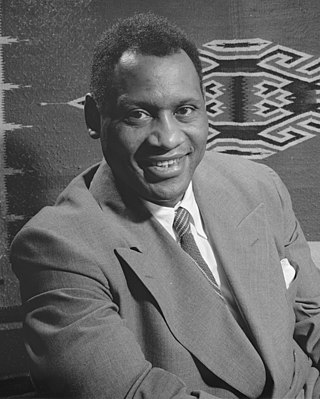
Paul Leroy Robeson was an American bass-baritone concert artist, actor, professional football player, and activist who became famous both for his cultural accomplishments and for his political stances.
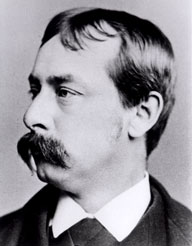
Francis Pharcellus Church was an American publisher and editor. In 1897, Church wrote the editorial "Yes, Virginia, there is a Santa Claus". Produced in response to eight-year-old Virginia O'Hanlon's letter asking whether Santa Claus was real, the widely republished editorial has become one of the most famous ever written.

The Apollo Theater is a multi-use theater at 253 West 125th Street in the Harlem neighborhood of Upper Manhattan in New York City. It is a popular venue for black American performers and is the home of the TV show Showtime at the Apollo. The theater, which has approximately 1,500 seats across three levels, was designed by George Keister with elements of the neoclassical style. The facade and interior of the theater are New York City designated landmarks and are listed on the National Register of Historic Places. The nonprofit Apollo Theater Foundation (ATF) operates the theater, as well as two smaller auditoriums at the Victoria Theater and a recording studio at the Apollo.
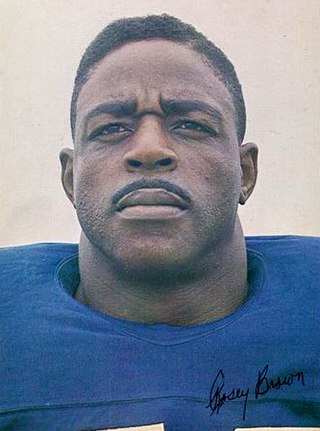
Roosevelt "Rosey" Brown Jr. was an American professional football offensive tackle who played in the National Football League (NFL) for the New York Giants from 1953 to 1965. He played college football for the Morgan State Bears and was selected by the Giants in the 27th round of the 1953 NFL draft.
Massive resistance was a strategy declared by U.S. senator Harry F. Byrd Sr. of Virginia and his son Harry Jr.'s brother-in-law, James M. Thomson, who represented Alexandria in the Virginia General Assembly, to get the state's white politicians to pass laws and policies to prevent public school desegregation, particularly after Brown v. Board of Education.
Henry Edward Garrett was an American psychologist and segregationist. Garrett was President of the American Psychological Association in 1946 and Chair of Psychology at Columbia University from 1941 to 1955. After he left Columbia, he was visiting professor at the University of Virginia. A.S. Winston chronicles that he was involved in the International Association for the Advancement of Ethnology and Eugenics (IAAEE), the journal Mankind Quarterly, the neofascist Northern League, and the ultra-right wing political group, the Liberty Lobby.

WVIR-TV is a television station in Charlottesville, Virginia, United States, affiliated with NBC and The CW Plus. Owned by Gray Television, the station has studios on East Market Street in downtown Charlottesville, and its primary transmitter is located on Carters Mountain south of the city.

John Mitchell Jr. was an American businessman, newspaper editor, African American civil rights activist, and politician in Richmond, Virginia, particularly in Richmond's Jackson Ward, which became known as the "Black Wall Street of America." As editor of the Richmond Planet, he frequently published articles in favor of racial equality. In 1904, he organized a black boycott of the city's segregated trolley system.
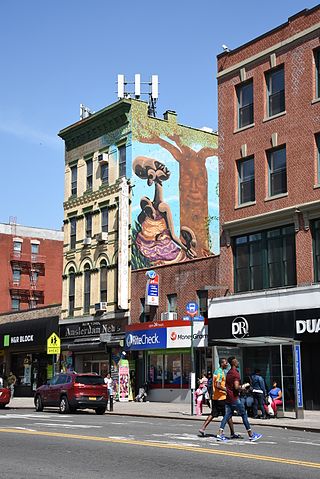
The Amsterdam News is a weekly Black-owned newspaper serving New York City. It is one of the oldest newspapers geared toward African Americans in the United States and has published columns by such figures as W. E. B. Du Bois, Roy Wilkins, and Adam Clayton Powell Jr., and was the first to recognize and publish Malcolm X. It operated from the New York Amsterdam News Building on Seventh Avenue in Harlem from 1916-1938. The building is a National Landmark.
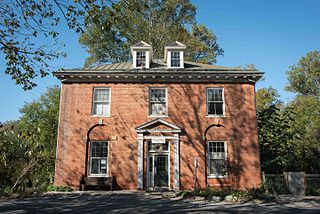
Esmont is a census-designated place (CDP) in Albemarle County, Virginia, United States. The population as of the 2020 Census was 491.

Black Issues Book Review was a bimonthly magazine published in New York City, U.S., in which books of interest to African-American readers were reviewed. It was published from 1999 until 2007.

Herb Boyd is an American journalist, teacher, author, and activist. His articles appear regularly in the New York Amsterdam News. He teaches black studies at the City College of New York and the College of New Rochelle.

Emerge was a monthly news magazine that was published from 1989 to 2000. Its primary focus was on issues of interest to African Americans. In 2000, Time said Emerge was "the nation's best black newsmagazine for the past seven years" the St. Louis Post-Dispatch described it as "the premier source for intellectual discussion on issues affecting African-Americans", and the New York Amsterdam News wrote that "it had no rival for cutting edge news for and about the black community". The magazine was headquartered in Washington, D.C.

Sarah-Lindsay Patton "Pattie" Boyle was an American author and civil rights activist from Virginia during the Civil Rights Movement. She is the author of The Desegregated Heart and various articles and books about race relations in Virginia and the South. Boyle was a "faculty wife" of drama professor, E. Roger Boyle, at the University of Virginia. Boyle was the first white person to serve on the board of directors for the Charlottesville NAACP chapter. She was "an outspoken advocate for desegregation in her native South."
The Charlottesville-Albemarle Tribune was a weekly newspaper in Charlottesville, Virginia published by and for African-American residents of the city.
Randolph Lewis White (1896–1991) was an African American newspaper publisher, hospital administrator, and civil-rights activist in Charlottesville, Virginia.
The Reflector was a weekly newspaper in Charlottesville, Virginia, that ran from 1933 to at least 1935. Edited by T. J. Sellers, it called itself "Charlottesville's Only Negro Weekly." It included articles on local and national news, social columns, and editorials and articles on topics of particular interest to black readers such as racial identity, lynching, and famous African Americans. The publication captured aspects of life under Jim Crow laws in this small city, including a regular feature on events at segregated Jefferson High School. In 2003, a new Charlottesville newspaper began publication as The African American Reflector, in honor of the original newspaper's editor.
Esmont High School was a segregated school for African American students in Albemarle County, Virginia from 1904 to 1951. This and the Albemarle Training School were the two high schools for Black students in the County.This school served a small rural population, graduating fourteen students in 1942 and nine students in 1943. In 1944 the school expanded from two to three teachers and developed a departmental structure for the first time. In 1951, its student population moved to Burley High School. Nine years after the school closed, in 1960, Yancey Elementary School opened on the same site.

William Clarence Hueston Sr. was an American lawyer, magistrate, and community leader. Hueston was the first African-American graduate from the University of Chicago Law School. He served as the first African-American judge in Gary, Indiana, as president of the Negro National Baseball League, and as the first African-American Assistant Solicitor in the United States Post Office Department within the Hoover administration. Hueston practiced law in private firms and was an influential activist for African-American civil rights throughout his life. An active member of fraternal organizations, Hueston served as education commissioner and grand secretary within the Improved Benevolent and Protective Order of the Elks of the World.
References
- ↑ "Charlottesville Bridge Builders | Biographies".
- ↑ P, Young, Jr. "University of Virginia Yields to Court Order." New Journal and Guide (1916-2003) Sep 09 1950: 2. ProQuest. 10 Apr. 2018 .
- ↑ "Mrs. Eleanor B. Sellers Dead." New York Amsterdam News (1962-1993) Nov 04 1967: 4. ProQuest. Retrieved 2018-4-10.
- ↑ "First Birthday" New Journal and Guide (1916-2003) Sep 04 1943: 1. ProQuest. 10 Apr. 2018 .
- ↑ "Charlottesville Council Candidate Boosted by Sellers in Radio Talk." New Journal and Guide (1916-2003) Mar 30 1946: 3. ProQuest. Retrieved 2018-4-10 .
- ↑ "Meet Virginia Governor, Seek More Jobs." The Chicago Defender (National edition) (1921-1967) Jan 12 1952: 13. ProQuest. Retrieved 2018-4-10.
- ↑ P. Young, Jr. "University of Virginia Yields to Court Order." New Journal and Guide (1916-2003) Sep 09 1950: 2. ProQuest. Retrieved 2018-4-10.
- ↑ Boyle, Sarah Patton (2016-10-27). The Desegregated Heart: A Virginian's Stand in Time of Transition. Pickle Partners Publishing. ISBN 9781787201897.
- 1 2 3 4 "T.J. Sellers to be NAACP Speaker Here, May 17th". Charlottesville-Albemarle Tribune. May 9, 1974.
- ↑ "Photo Standalone 60 -- no Title." New York Amsterdam News (1962-1993) Jul 11 1964: 46. ProQuest. Retrieved 2018-4-10.
- ↑ Editor's note in Sellers, T. J. "An Answer to Shanker." New York Amsterdam News (1962-1993) Jan 25 1975: 5. ProQuest. Retrieved 2018-4-10.
- ↑ Editor's note to Sellers, T. J. "If I had My Way, Inner-City Teachers would:" New Journal and Guide (1916-2003) Jan 05 1974: 9. ProQuest. Retrieved 2018-4-10.
- ↑ Editors note to Sellers, T. J. "Black Pride: The Genuine Kind." New Journal and Guide (1916-2003) Nov 13 1976: 8. ProQuest. Retrieved 2018-4-10.
- ↑ "The Reflector". Chronicling America. Library of Congress. Retrieved 2018-04-10.
- ↑ "Race and Place Newspapers". www2.vcdh.virginia.edu. Retrieved 2018-04-10.
- ↑ "The Reflector: Holdings". Chronicling America. Retrieved 2018-04-10.
- ↑ Vessells, A. L. "Union Freshman Edits Magazine." The Chicago Defender (National edition) (1921-1967) Jun 08 1935: 24. ProQuest. Retrieved 2018-4-10.
- ↑ "College Editors Organize." The New York Amsterdam News (1922-1938) Apr 24 1937: 23. ProQuest. Retrieved 2018-4-10.
- ↑ James, Michael E. (2005). The Conspiracy of the Good: Civil Rights and the Struggle for Community in Two American Cities, 1875-2000. Peter Lang. p. 318. ISBN 9780820457796.